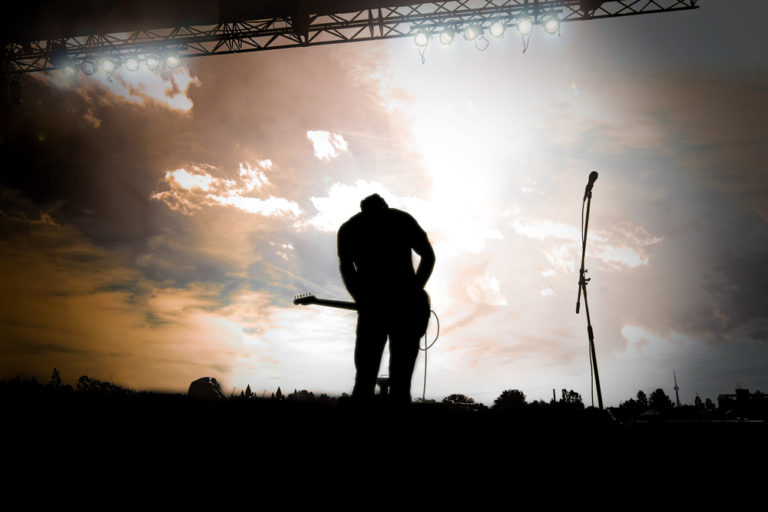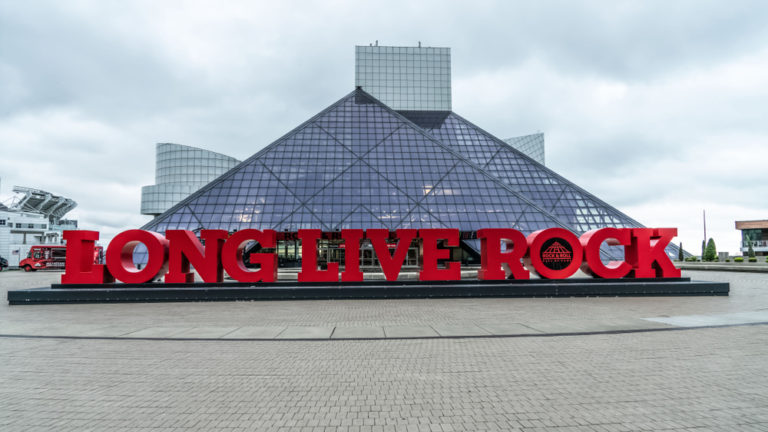What Is The Spirit Of Rock And Roll?
The ancient ones among us tell in reedy voices of the old pantheons of Music when times were darker and mostly quiet with only acoustic instruments to play. They speak of the lesser gods of classical, blues, country music, and jazz in reverent tones and describe grand orchestras and marching brass bands. Their followers congregated in small loyal gatherings to pay homage to their deities and intellectually defend their faith.
The Spirit of Rock and Roll is passion, power, sexuality, and heat. It’s loud, pervading, angry yet joyful, inspiring the deepest reaches of the human soul. It’s music for the people by the people, uniting millions in rock concerts, television programs, and the internet around their favorite bands.
The lesser gods were harsh and laid down strict rules for their followers. It often took years to learn, play, and understand their musics. Those minor deities and their devotees vigorously defended their turf, dealing mercilessly with interlopers who deviated from their commandments.
In the Beginning
The lesser gods forgot about the One that had created them all. The One that said the Music was about the passions of the human heart, not the cold, clinical rules of the mind. The One said the Music was for the sheer joy that vibrated in the chest and exploded with power, creating spiritual oneness in all who heard it.
The lesser gods continued their petty squabbles and clandestine love affairs. They forgot their roots and chose to inspire only a select few. The One brooded over the antics of the lesser gods and felt disappointed. The music no longer served the people; the people served it.
The lesser gods had lost the plot. For too long, music could only be played by elites for the cognoscenti. In those far off days, that learned sage, Mr. Leonidas Fender, was just a glimmer in his father’s eye, and acoustic instruments could only reach so far.
Eventually, the One decided enough was enough. In the ether, it beheld the floating blue notes, the swirling jazz scales, and the beating tribal drums of the ancestors and an idea began to take shape. It started whispering in the hearts and minds of the common people, not sharing with the lesser gods what it was doing.
The young people started to question the minor gods and their musics. They began to rebel against the repressive and oppressive strictures of previous generations. The old music no longer expressed their feelings, longings, and passions. They began to question.
Knowing there was a need for a new voice to express the tsunami of music to come, the One dripped inspiration into the mind of Leo Fender, and in 1950 the Fender Esquire was born. It was the first ever mass-produced electric guitar.
A voice for the people at last! Mr. Fender continued to tinker and came up with the Telecaster and then the Precision Bass. No more heavy, upright, expensive double-basses for the new music. It had to travel fast and light to reach the world. Then in 1954 came the legendary Fender Stratocaster, and the life of music changed forever.
Other manufacturers such as Rickenbacker, Gibson, Epiphone, Gretsch, and Höfner produced their own offerings of the solid-body electric guitar for the people. The rock heroes demonstrated that you did not have to be a musical maestro to play the music. The fans began to learn the new music for themselves and became empowered to make their own. Bands started popping up everywhere.

The Spirit of Rock In The Sixties and Seventies
By the late 1960s, hybrids of the old musics began to arise as the people sought new rhythms and sounds to express their freedom, sexuality, joy, rage, passion, and power. In America, the venerable Chuck Berry, Elvis Presley, and Carl Perkins heard the voice of the One and picked up the electric guitar.
The new music caught fire. Charles Edward Anderson Berry, ‘Chuck’ to his friends and fans, wrote and played Johnny B Goode in 1958. He dazzled the crowds with his showmanship. Chuck became famous for songs like Maybelline and Rock and Roll Music. He was inducted into the Rock and Roll Hall of Fame, cited for laying the groundwork “for not only a rock and roll sound but a rock and roll stance”.
Rock music is not for sitting primly in a chair while commenting on the performer’s technique. It’s dramatic, passionate movement, striking poses, leaping about, and going crazy. It’s a whole-body experience. The great god of Music was beginning to smile again.
Jerry Lee Lewis’s 1964 live album is regarded by many as “one of the wildest and greatest live rock albums ever”.” While Lewis played the piano, the Spirit of Rock and Roll was strong, with Kenny Lovelace on guitar. Everyone has heard of Great Balls of Fire and Good Golly Miss Molly.
The new heroes experimented with distortion, feedback from electric amplifiers, and the tremolo systems on their electric guitars. The crowds went wild. This was what they hungered for. Music with passion and power, knowledge and truth. Music from the gut.
Across the Atlantic, the Beatles, the Rolling Stones, and the Kinks heard the call. Albums of songs were released in favor of singles recordings, and the rock album was born. Paul McCartney used his famous Höfner Violin electric bass before switching to Rickenbacker. George Harrison started with Gretsch guitars before moving to Rickenbacker, Gibson, Epiphone, and Fender.
The Grateful Dead formed in 1965, and it has been said that their music touches on ground most other groups don’t even know exist. Their devout fans, known as Deadheads, followed them around the country, and they sold more than thirty-five million records around the globe.
The great god of Music sang to Keith Richards of the Rolling Stones in a dream. While sleeping, he wrote “Satisfaction” and recorded a rough version of the main riff on a cassette recorder. When he woke up, he couldn’t recall writing it. When they recorded it, the Stones used a Gibson Maestro Fuzzbox to add sustain and that fuzzy distortion we all know and love.
When the song was released in 1965, Gibson’s entire stock of fuzzboxes sold out that year. People didn’t just want to sing and dance to “Satisfaction”; they wanted to play it for themselves. The lyrics express confusion and irritation with the growing commercialism in the world. Mick Jagger said it captured a very important spirit of the times – alienation.
In keeping with the music, people began to speak differently, act differently, dress differently. It transcended social barriers and inspired the youth to be more, do more, become more. They experimented with psychedelics. Life became a kaleidoscope of color, sound, and movement.
Rock music colonized all the musics that had come before it. The lesser gods fumed as they realized what was happening. They fought back through the older generations that were their followers. Many rock songs were banned from the radio for being too suggestive and shocking to the prudish sensibilities of these followers.
Irate parents around the world shouted at teenagers, “Turn that down!” The lesser gods reacted early on. In 1956, Rock and Roll “and other frenzied music” were banned entirely in Santa Cruz, California. The authorities said it was “detrimental to both the health and morals of our youth and community”.
Lola, a song by the Kinks telling the story of a young man’s romantic involvement with a trans woman, was banned. Lucy in the Sky with Diamonds by the Beatles is about LSD and was also banned. The Rolling Stones were banned from the Ed Sullivan show for singing ‘Let’s Spend The Night Together’ instead of “Let’s Spend Some Time Together” as the producers wanted.
The song “Only God Knows” by the Beach Boys was banned from radio for “blasphemy”. “(I Can’t Get No) Satisfaction” by the Rolling Stones was pulled from radio station playlists in 1965 for having sexually suggestive lyrics. Only pirate radio stations would play it at first in the UK, and it was censored on TV because Mick Jagger’s onstage gyrations were regarded as lewd.
In 1967, The Doors were banned from the Ed Sullivan show for singing “Light My Fire’ with the word “higher” seen as a reference to drugs. The contraceptive pill had been invented in May 1950, freeing women to enjoy sex without fear of pregnancy. The lesser gods weren’t having any of it! Women were lesser beings and didn’t have a say over their own bodies.
Rock music turned all the old rules and formulas for music on their heads. A strong music underground developed as a backlash against the formulaic, commercially driven mainstream music culture. Nothing the lesser gods could do was going to stop the new music.

More rock legends were born. The One spoke, and the Jimi Hendrix Experience and Led Zeppelin came to be. The latter became the progenitors of hard rock and heavy metal. Led Zeppelin became one of the best-selling bands of all time as their influence spanned the late sixties through the seventies and beyond.
Led Zeppelin guitarist Jimmy Page is still widely regarded as one of the greatest rock guitarists of all time, and his band went on to inspire countless others through the generations that followed. He loved those old Blues guys Buddy Guy, Elmore James, Otis Rush, Hubert Sumlin, Freddie King, and BB King. His school’s Deputy Head was scathing over his dreams of a music career, and they had a big row.
All would agree that he fought the lesser gods and won. The One certainly smiled on Led Zeppelin as other musicians envied and tried to emulate their famous riffs. Sadly, the band broke up in 1980 after the tragic death of drummer John Bonham. The early pioneers of rock paid a heavy price for fame and fortune. Although the band did occasional shows in the decades that followed, things were never the same, but Page continued to have a successful career with other projects.
Ears and minds and hearts opened to the Music as never before. They wrote songs about emancipation, sex, money, drugs, suicide, politics, war, betrayal, and divorce. Sometimes it seemed to them that the songs just wrote themselves.
Jimi Hendrix is regarded as one of the most influential guitarists in the world. He was a true virtuoso, famous for his experiments with wah-wah and fuzz pedals and amplifier feedback. In 1969 he was the highest-paid performer in the world when he headlined the Woodstock Music Festival. His music is characterized by overdriven amplifiers with high volume and gain.
There is a story that Jimi and his band were banned from the BBC for not sticking to the producer’s rules and playing a tribute to Eric Clapton, Jack Bruce, and Ginger Baker of Cream instead of doing a sweet duet with the show’s host Lulu.
Sadly, some of the heroes like Jimi Hendrix, Janis Joplin, Brian Jones of the Rolling Stones, and Jim Morrison became martyrs to the cause and died at twenty-seven. Since then, many others have joined the 27 Club as it is known. These people came to us for just a short time to channel the Spirit of Rock in unprecedented ways before leaving the world too soon.
Van Halen formed in 1972, restoring hard rock to the music scene and further paving the way for heavy metal. Their albums went multi-platinum in the eighties and beyond. To this day, Eddie Van Halen is one of the greats of rock guitar, famous for his two-handed solo tapping technique. Eddie wasn’t taught to read music, but he watched recitals of Bach and Mozart and learned to improvise.
Black Sabbath formed in 1968 with Tony Iommi on guitar, Geezer Butler on bass, Bill Ward on drums, and Ozzy Osbourne on vocals. Their down-tuned guitars and horror-themed songs shocked the lesser gods. Since then, they have sold more than seventy million records and were one the most commercially successful heavy metal bands ever. They ended firing Ozzy Osbourne for substance abuse but continued with other band members.
Black Sabbath is well known in the music world for resurrecting the devil’s chord. This is the tritone that the lesser gods dubbed “Diabolus in musica” and banned in the Middle Ages. It had many names and discomforted the lesser gods and their followers with its sinister tone that defied their melodic expectations. Since then, Judas Priest, Slayer, Metallica, Slipknot, Marilyn Manson, and many others have all used it with relish.

The Spirit of Rock In The Eighties
The One wasn’t finished. The Eighties saw the rise of Guns N Roses, Queen, Metallica, AC/DC, Journey, and Motorhead. The new bands wanted deeper, darker sounds and began using drop tunings frequently. MTV, which launched in 1981, became a showcase for videos of rock bands and spread the gospel of the new Music to millions around the globe.
Judas Priest, Megadeth, Iron Maiden, The Police, Aerosmith, ZZ Top, Motley Crue, Dio, Dire Straits, and Poison emerged from the shadows. Everyone got sucked into the Music as they were exposed to it not only on the radio but on television and in concert arenas that drew hundreds of thousands. Rock was breaking free.
Slayer, Twisted Sister, Sepultura, Pantera, and Exodus offered a darker take on the Music. Thrash metal and speed metal became prevalent, and although they were not considered mainstream, they influenced new generations of rock musicians. The Music underground was richer than ever, with Punk Rock and Hardcore Punk tracing their beginnings there.
People sometimes look back on the eighties and think it was a lackluster period for the One, but if you count how many famous bands emerged around then it is clear that Rock music was exploding. Instead of just a handful of groups, there were now fifty or more as musicians explored and diversified the new music.
The Spirit of the Eighties was characterized by heavy distortion, pinch harmonics, and screaming whammy bars. It influenced the more mainstream pop music. The guitar was more prominent than ever, with Joe Satriani, Steve Vai, Randy Rhoads, and Yngwie Malmsteen at the helm. Bass guitar also took off with the likes of Cliff Burton of Metallica, Les Claypool of Primus, and Geddy Lee of Rush.
In the eighties, rock music spread across the globe, and glam metal rose to dizzying heights with screaming high-pitched vocals. Heavy metal reigned supreme with Jump by Van Halen, Back in Black by AC/DC, and Breaking the Law by Judas Priest. Who hasn’t heard I Love Rock’ n Roll by Joan Jett, Don’t Stop Believin by Journey, Heart’s Barracuda, or Queen’s Another One Bites The Dust?
The energy of rock music in the eighties was huge, fiery, anthemic, and relevant. The creative impulse whispered by the One into the ears and hearts of the sixties went supernova in the eighties. Everyone wanted a guitar. Music snobs inspired by the lesser gods over the centuries regarded it as unsophisticated. Folk musicians advocated for acoustic guitar but despised the electric version.
But then Bob Dylan appeared in 1965 appeared at the Newport Festival with an electric guitar and a band, and nothing has been the same ever since. The sheer power of this instrument for the people resulted in a tsunami of demand for virtuosos and beginners alike. It has become the most accessible, versatile musical instrument in the modern world. The One saw it and was pleased.
Alternative Rock bands were signed with independent record labels, although it was mainly underground in the eighties. We saw the rise of the Violent Femmes, Nine Inch Nails, Ministry, Mudhoney, and Nirvana. Grunge, as they called it, fused heavy metal and punk rock elements and emerged in the American Pacific North-West in Seattle and surrounding towns.
The lyrics of grunge are filled with angst and introspection, expressing themes of betrayal, isolation, neglect and abuse, self-doubt, and a desire for freedom. Grunge continued into the nineties but didn’t last much beyond them as bands broke up and Kurt Cobain became a member of the 27 Club in 1994.
But who can forget the glory that was Nirvana with their themes of social alienation and abjection! Their album Bleach was influenced by the Black Sabbath of the seventies, the punk rock of Mudhoney and the Melvins. Many of the bands that were stuck with the grunge moniker, including Cobain, didn’t appreciate it because in America, “grunge” meant dirt or a repugnant person.
Dream Theater, a progressive metal band, was formed in 1985 with Berklee College of Music students John Myung on bass, Mike Portnoy on drums, and John Petrucci on guitar. Their second album, Images and Words, was the highest-selling, but their fifth album Metropolis Pt 2: Scenes From A Memory, released in 1999, was ranked as one of the greatest guitar albums of all time by Guitar World magazine.
By the eighties, the lesser gods had given up the fight almost completely. They retired to the corners of their pantheon to grumble and complain as they finally recognized that the One’s hand could not be stayed.

The Spirit of Rock In The Nineties and Beyond
The eighties became the nineties. Nirvana released their album Nevermind; Green Day released Dookie, Metallica sang Wherever I May Roam. Aerosmith was on the rise with Crazy; Pearl Jam wrote Rearviewmirror. The Red Hot Chili Peppers popularized funk-rock, and Flea made his name as a bassist.
Metallica released their album Metallica, and it sold over sixteen million copies in the United States alone. The album entered the top of the charts in ten countries. In September 1991, 1.6 million rockers came to Moscow to enjoy the Monsters of Rock Series open-air concert, where Metallica played.
Metallica is right up there with the most commercially successful bands of all time, with more than 125 million albums sold worldwide as of 2018. They have continued to play and release albums into the millennium and beyond.
Although the Red Hot Chili Peppers formed in 1983, their first major commercial success was with Blood Sugar Sex Magik in 1991. Guitarist Frusciante, plagued by drug addiction, left the band soon after, and they released One Hot Minute with Dave Navarro on guitar. He returned in 1998, and in 1999 they released Californication, which sold over sixteen million copies.
Pearl Jam, Soundgarden, and Alice in Chains were doing well on the grunge scene, and Aerosmith was flying high. The UK saw Radiohead, Blur, and Oasis. Kiss recorded their album Revenge and became a significant influence for the Foo Fighters, Pearl Jam, and Nirvana. Pantera released Cowboys From Hell and Vulgar Display of Power. Anthrax was still around and on the rise commercially.
Dave Grohl, Nirvana’s drummer, formed the Foo Fighters in 1994 after Kurt Cobain’s suicide. The foo fighter was a nickname coined by fighter pilots for UFOs, and this is where the band took it from. Their ninth studio album, Concrete, and Gold was the second one to reach number one in the US. In February 2021, they released their tenth album, Medicine at Midnight.
Tool was formed in the nineties and soon attracted a loyal following. The album Undertow dominated the alternative Metal Movement. They released Aenima in 1996, Lateralus in 2001, and 10 000 Days in 2006 to critical acclaim and achieving international commercial success. In August 2019, Fear Inoculum was released to the delight of fans and critics alike. Their sound is a mix of progressive, psychedelic, and art-rock.
By 2018 Dream Theater had sold over twelve million records worldwide, and they had two Grammy nominations. The band was expected to be working on their fifteenth studio album in 2021. Music had taken on a life of its own in the hearts and minds of so many that all their petty rules were thrown out of the window.
Muse, The Damned Things, Seether, Sum 41, and Godsmack, were all going strong, delighting a new generation of rock fans. Greta Van Fleet introduced the youth to the glories of Zeppelinesque style music. Linkin Park took the world by storm, and Disturbed released several albums, reinventing Paul Simon’s Sound of Silence as a monster hit in 2019.
Alter Bridge formed in 2004 and released their first album, One Day Remains to reach number 5 on the US Billboard charts. Their song Blackbird received critical acclaim and is still highly rated for its guitar solo. There are so many successful rock bands coming out of the last two decades it would be difficult to name them all.
Conclusion
The spirit of rock music is still strong, with rock bands taking the top three best-selling albums in the US in March 2021. Guns N Roses, Red Hot Chili Peppers, and Mastodon are scheduled to release new albums in 2021. Guitarist Slash is expected to release a fifth solo album featuring Alter Bridge vocalist Myles Kennedy. The One surveys its body of work and is well pleased.








